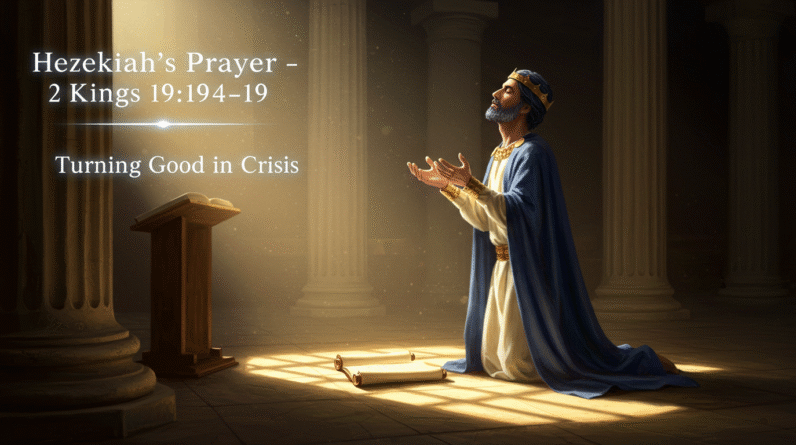In times of trouble, we often find ourselves searching for strength and guidance. It is during these moments when the words of ancient wisdom can provide solace and resilience. Psalm 61:1-2 offers a comforting reminder that no matter how overwhelming our challenges may be, there is always a source of unwavering support. This article explores the profound message of strength and hope found within these verses, offering insight and encouragement to those navigating their own difficulties.
Heading 1: Understanding Psalm 61:1-2
Background of Psalm 61
Psalm 61 is an important passage in the book of Psalms, which is a collection of poetic and lyrical songs used in both personal and communal worship. It is believed to have been written by King David during a time of distress and uncertainty. The psalmist is in a place of desperation and is seeking refuge and comfort in God.
The Author of Psalm 61
As mentioned earlier, Psalm 61 is attributed to King David. David was a prominent figure in the Bible, known for his strong faith and his musical abilities. He faced numerous challenges and trials throughout his life, but he always turned to God for guidance and support. The psalms he wrote reflect his deep relationship with God and his reliance on divine strength.
The Context of Psalm 61:1-2
Psalm 61:1-2 specifically focuses on seeking refuge and finding strength in God during times of trouble. It serves as a reminder that no matter what challenges we face, we can always turn to God for solace and protection. The psalmist expresses their cry for help and acknowledges that God is their strong tower and a source of refuge.
Heading 2: Seeking Refuge in God
What It Means to Seek Refuge
To seek refuge in God means to find shelter and safety in His presence. It is a conscious choice to turn to Him when we feel overwhelmed, threatened, or unsure. Seeking refuge in God involves surrendering our worries and fears to Him, trusting that He will provide us with the comfort and protection we need.
The Benefits of Seeking Refuge in God
When we seek refuge in God, we unlock numerous benefits that strengthen us in times of trouble. Firstly, seeking refuge in God grants us peace of mind. It reminds us that we are not alone in our struggles and that God is always there to support us. Additionally, seeking refuge in God provides us with comfort and reassurance, knowing that He is in control and has a plan for our lives. It gives us a sense of security, knowing that we have a loving and powerful God watching over us.
Heading 3: The Confidence in God’s Protection
The Cry for God’s Ear
In Psalm 61:1, the psalmist cries out to God, acknowledging their desperate need for His intervention. This cry demonstrates a deep dependence on God and a recognition that they cannot face their troubles alone. By appealing to God, they express their trust in His ability to protect and guide them.
The Strong Tower of God’s Presence
Verse 3 of Psalm 61 compares God’s presence to a strong tower, indicating His strength, stability, and unwavering protection. Just as a tower provides safety and security to those seeking refuge, God’s presence offers the same. The psalmist finds solace in knowing that God is their steadfast stronghold, a place where they can find shelter and receive the strength to overcome their challenges.
Heading 4: The Elevated Rock as a Metaphor
The Symbolism of the Rock
In Psalm 61:2, the psalmist refers to God as their “rock.” This metaphor holds deep significance. Rocks are known for their durability and stability. They withstand the test of time and remain firm despite external forces. By likening God to a rock, the psalmist emphasizes His steadfastness and unchanging nature.
Finding Strength on the Elevated Rock
The term “elevated rock” suggests that God is not merely a rock on the ground but a high and exalted rock. This imagery portrays God as a secure and elevated place where the psalmist can find strength and refuge. Just as standing on a high rock provides a vantage point to see beyond the present difficulties, relying on God as an elevated rock gives us a broader perspective and a renewed sense of hope.
Heading 5: The Assurance of God’s Faithfulness
The Author’s Trust in God’s Faithfulness
Throughout Psalm 61, the author repeatedly demonstrates their trust in God’s faithfulness. They draw on past experiences of God’s deliverance, which serves as a source of confidence. This trust in God’s faithfulness enables the psalmist to turn to Him in times of trouble, knowing that He will never abandon them.
God’s Covenant-Keeping Nature
The psalmist’s trust in God’s faithfulness stems from the understanding of His covenant-keeping nature. God has consistently demonstrated His faithfulness to His people throughout history, fulfilling His promises and providing for their needs. This assurance of God’s faithfulness gives us the confidence to approach Him in times of trouble, knowing that He will remain true to His character.
Heading 6: Trusting God in All Circumstances
Finding Strength in Unstable Times
Trusting God in all circumstances means relying on Him even when things seem uncertain or unstable. It is acknowledging that God is in control, regardless of the chaos or challenges around us. When we trust God in unstable times, we find strength and stability that surpasses our own understanding.
The Call to Constant Trust
Psalm 61:2 serves as a reminder to continually trust in God. It encourages us to rely on Him not only during times of trouble but also in everyday life. This constant trust allows us to experience a deeper level of peace and security, knowing that God is always with us and will guide us through any situation.
Heading 7: The Power of Prayer and Petition
The Effectiveness of Prayer
In Psalm 61:1, the psalmist’s cry for God’s ear highlights the power of prayer. Prayer is a way for us to communicate with God, expressing our thoughts, concerns, and desires. It is a means of seeking His guidance, strength, and provision. The effectiveness of prayer lies in the fact that it enables us to connect with the Creator of the universe, who is attentive to our needs.
Presenting Our Needs Before God
Prayer and petition involve presenting our needs and desires before God. When we bring our requests to Him, we acknowledge our dependency on His wisdom and provision. By presenting our needs before God, we invite His intervention in our lives and invite Him to work on our behalf.
Heading 8: The Tabernacle Symbolism in Psalm 61:4
Understanding the Tabernacle
The tabernacle was a sacred tent used by the Israelites as a place of worship and encounter with God. In Psalm 61:4, the psalmist expresses a desire to dwell in God’s tabernacle forever. This symbolism represents a deep longing to be in God’s presence constantly, enjoying His protection, guidance, and intimacy.
Drawing Near to God in Difficulties
The tabernacle symbolism reminds us that even in the midst of difficulties, we can draw near to God and find solace in His presence. Just as the Israelites sought refuge and worshiped in the tabernacle, we can come before God with our burdens and find comfort, knowing that He is near and attentive to our needs.

Heading 9: Remembering God’s Past Deliverance
Recalling God’s Past Faithfulness
Remembering God’s past deliverance is a powerful tool for strengthening our faith in times of trouble. The psalmist in Psalm 61 reflects on God’s faithfulness and deliverance, which serves as a source of confidence for the present and the future. Recalling past instances where God has shown up and brought us through difficult times reminds us of His goodness and gives us hope for what He can do again.
Gaining Confidence for the Future
When we remember God’s past deliverance, we gain confidence for the future. We are reminded that the same God who delivered us in the past is faithful and capable of delivering us again. This assurance enables us to face challenges with renewed courage and trust, knowing that God is with us.
Heading 10: Finding Peace and Rest in God
The Deep Desire for Peace
In the midst of trouble, we often long for peace and rest. Psalm 61 expresses this deep desire for peace and comfort that only God can provide. It acknowledges our human limitations and turns to God as the ultimate source of peace, recognizing that true rest can only be found in His presence.
Experiencing Divine Renewal and Restoration
When we find peace and rest in God, we experience divine renewal and restoration. Just as the psalmist in Psalm 61 sought refuge in God and found strength, we too can find comfort and rejuvenation in His presence. God’s peace transcends our understanding and brings healing to our weary souls, allowing us to face the challenges of life with renewed strength and hope.
In conclusion, Psalm 61:1-2 offers profound wisdom and encouragement for finding strength in times of trouble. By seeking refuge in God, trusting in His protection, and recalling His past faithfulness, we can experience His peace, rest, and renewal. As we rely on Him and present our needs before Him through prayer, He becomes our firm foundation and strong tower, guiding us through every difficulty. May we continually turn to God for refuge, finding strength and comfort in His unwavering love and faithfulness.











